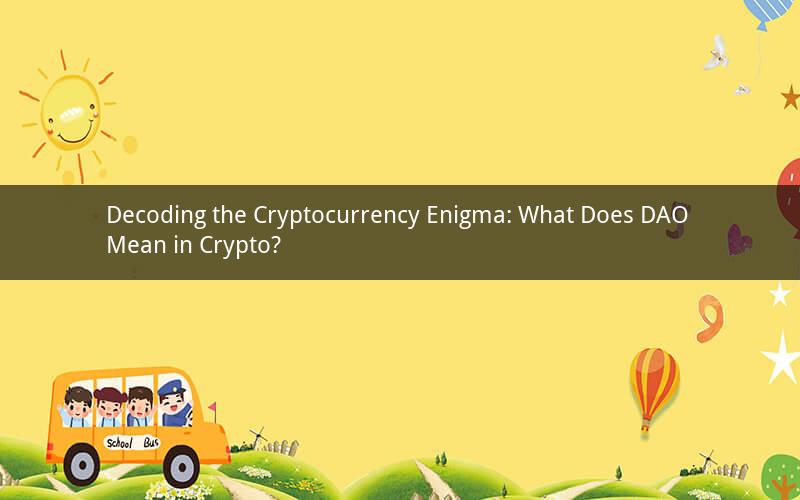
In the rapidly evolving world of cryptocurrencies, understanding the jargon is essential for any investor or enthusiast. One term that has gained significant attention is DAO, which stands for Decentralized Autonomous Organization. This article delves into the meaning of DAO in the context of cryptocurrency, its significance, and its potential impact on the future of digital assets.
The Concept of DAO
At its core, a DAO is an organization that operates through decentralized governance. Unlike traditional corporations, where decisions are made by a board of directors or shareholders, a DAO operates autonomously based on smart contracts and blockchain technology. The term "autonomous" refers to the ability of the organization to execute tasks and make decisions without human intervention.
The primary goal of a DAO is to distribute power and control among its members, ensuring transparency and fairness. By leveraging blockchain technology, a DAO eliminates the need for a central authority, making it immune to manipulation and corruption.
How DAO Works
The functioning of a DAO is based on smart contracts, which are self-executing contracts with the terms of the agreement directly written into lines of code. These contracts run on blockchain networks, ensuring that once deployed, they cannot be altered or manipulated.
Members of a DAO contribute to the organization by staking their cryptocurrency tokens. The more tokens a member holds, the more influence they have in decision-making processes. This token-based system ensures that decisions are made collectively and fairly, reflecting the will of the majority.
When a decision needs to be made, it is proposed as a "proposal" within the DAO. Members can vote on these proposals, and the outcome is determined by the majority. The blockchain records every vote, ensuring transparency and immutability.
Benefits of DAO in Cryptocurrency
1. Decentralization: DAOs eliminate the need for a central authority, reducing the risk of manipulation and corruption. This decentralization promotes trust and fosters a more democratic approach to governance.
2. Transparency: Every transaction and decision within a DAO is recorded on the blockchain, making it impossible to alter or manipulate. This transparency ensures that all members have access to the same information, fostering trust and accountability.
3. Inclusivity: DAOs allow anyone with an internet connection to participate in decision-making processes. This inclusivity promotes diversity and encourages collaboration among individuals with different backgrounds and expertise.
4. Efficiency: By automating processes through smart contracts, DAOs can operate more efficiently than traditional organizations. This efficiency can lead to cost savings and faster execution of tasks.
5. Innovation: DAOs are built on blockchain technology, which is inherently innovative. By exploring new ways of organizing and operating, DAOs can drive innovation in various industries, including finance, healthcare, and education.
Potential Challenges of DAOs
Despite their numerous benefits, DAOs face several challenges:
1. Scalability: As DAOs grow, ensuring scalability while maintaining security and efficiency can be a daunting task. Developing scalable blockchain solutions is crucial for the long-term success of DAOs.
2. Regulatory Hurdles: The decentralized nature of DAOs makes them susceptible to regulatory scrutiny. Navigating the complex legal landscape is essential for the sustainability of DAOs.
3. Security Risks: While blockchain technology is secure, smart contracts can still be vulnerable to attacks. Ensuring the security of smart contracts is critical for the integrity of DAOs.
4. User Adoption: DAOs require a certain level of technical knowledge to participate. Educating potential members about the benefits and workings of DAOs is crucial for widespread adoption.
5. Centralization Risks: While DAOs aim to eliminate central authority, there is a risk of centralization in terms of token distribution and decision-making power. Balancing these factors is essential for the long-term success of DAOs.
Frequently Asked Questions (FAQs)
Q1: What is the difference between a DAO and a traditional corporation?
A1: A DAO operates through decentralized governance and smart contracts, eliminating the need for a central authority. In contrast, a traditional corporation is governed by a board of directors and shareholders, with decision-making power concentrated in a few individuals.
Q2: How do DAOs ensure transparency?
A2: DAOs ensure transparency by recording every transaction and decision on the blockchain, making it impossible to alter or manipulate. This transparency fosters trust and accountability among members.
Q3: Can DAOs be used for malicious purposes?
A3: Like any technology, DAOs can be used for both legitimate and malicious purposes. However, their decentralized and transparent nature makes it more challenging to engage in fraudulent activities.
Q4: Are DAOs legal in all countries?
A4: The legality of DAOs varies by country, as regulatory frameworks are still evolving. It is essential for DAOs to navigate the complex legal landscape to ensure compliance with local laws.
Q5: What are the future implications of DAOs in the cryptocurrency industry?
A5: DAOs have the potential to revolutionize the cryptocurrency industry by promoting decentralization, transparency, and inclusivity. As the technology matures, we can expect to see more innovative applications of DAOs in various industries.